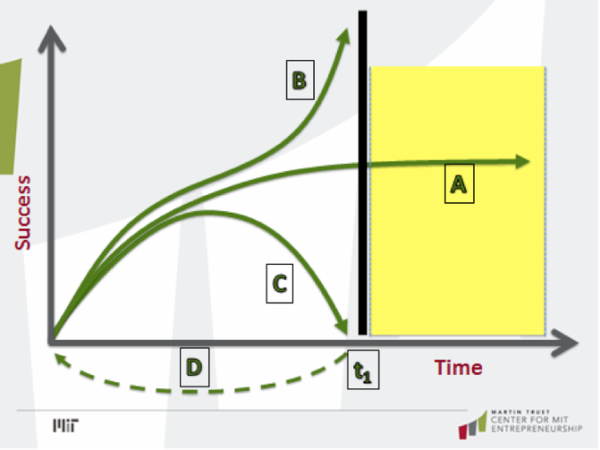A recent question about how the ‘Joyful Frog Digital Incubator’ got its name prompted CEO Hugh Mason to describe the difference between accelerators and incubators, writes Crystal Neri.

The job of an accelerator is to make (B) or break (C) a startup (after Bill Aulet, MIT)
JFDI.Asia is best known for its accelerator program, so a reader recently asked a tech blog why the ‘I’ in JFDI stands for ‘incubator’.
Hugh Mason explained: “Incubators have a long history (since at least 1959) and the model of what one does has evolved through offering space, then services and finally in the first .com era incubators claimed to add value through the networks around them. Then in the middle of the 2000s, researchers started noticing that things like YC and Techstars looked different but it was a few years before the first formal attempts were made to define why. Even then (in 2011) it wasn’t clear whether accelerators were genuinely something new or just another form of ‘third wave network incubator’.”
By the time the academics had started to argue, JFDI was already one year old.
Hugh continues: “Today I would definitely say that true accelerators are very different but there is no one model. We believe that community is the secret sauce (and everything else is open source) but that’s just our recipe. If you want a full tedious discussion on this subject, I did write a Masters dissertation about it.” Or you can check out our blog explaining Susan Cohen’s definition.
And as for the rest of the JFDI name?
https://youtu.be/pd00Q3g0pX4
Back in 2010. Hugh and JFDI co-founder Meng Wong were trying to think of something short, available as a domain name and which embodied the spirit of entrepreneurship. They liked Howard Stevenson’s definition but it was way too wordy for a name. Then, as Hugh remembers:
“One of us said, ‘What this is guy is saying is … JFDI! We both laughed because, in the West, JFDI stands for “Just F**ing Do It”. Then I remembered that I had bought the domain name jfdi.asia as a joke about a year earlier. So we went with it.”
The name stuck, but also created a dilemma.
“We decided that, if we are going to tell people that we can get them ready to raise money in 100 days, we had better do it ourselves or we are totally bogus,” Hugh says. “And sure enough on day 94 we had secured our first investors and a government grant … which came with a form that required us to spell out what ‘JFDI’ meant. We thought … this is Singapore! We can’t really tell them. What are we going to do ?”
The answer came on the way back from a lunch in Joo Chiat.
“On the way back through Geylang, we went past the ‘Eminent Frog Porridge Shop’, widely recognized as one of the best places to enjoy that Teo Chew delicacy in Singapore. And the name just popped into my head: ‘Joyful Frog Digital Incubator’. It made us laugh because it sounds like a bad translation of a Chinese four-character idiom.’ So the name stuck.
Meanwhile, some Chinese language scholar friends ran a competition to come up with a four character Chinese phrase and they settled on 佳孵蚪伴, which means something like ‘Good Hatch Tadpole Partner’ while also capturing many of the sounds of the English letters J, F, D and I.
Fortuitiously, it turns out that ecologists have observed two contrasting approaches to reproduction in nature. Animals like human beings have a small number of offspring and care for every one of them deeply. Trees shed thousands of seeds knowing that most will never make it. Frogs too – they take a portfolio approach – just like us.
And in popular mythology, most cultures are OK with frogs. For example in Ancient China, the frog-spirit Ch’ing-Wa Sheng was said to bring healing and good fortune to business. This lives on in Feng Shui, where a three-legged golden toad called Jin Chan (金蟾) is said to appear during full moon near houses that will receive good news. To this day, JFDI staff make sure that frog souvenirs which friends kindly bring face the office working area, rather than the front entrance, so that abundant ch’i (气) energises JFDI’s startups. If they faced toward the front entrance, the frog-power would surely escape through the door.
Last of all, an old story known in many parts of the East tells of a frog, prideful of the beauty at the bottom of his well, and ignorant of the world beyond.
As Hugh says; “We have met many small companies that hold themselves back, never feeling brave enough to seize a greater opportunity. I hope we help them make that joyful leap.”
——
 Crystal Neri writes content and handles social media at JFDI Asia. She loves to workout and cook and is dreaming of vagabonding (someday). Say Hi to her on Twitter, @nericrystal.
Crystal Neri writes content and handles social media at JFDI Asia. She loves to workout and cook and is dreaming of vagabonding (someday). Say Hi to her on Twitter, @nericrystal.

